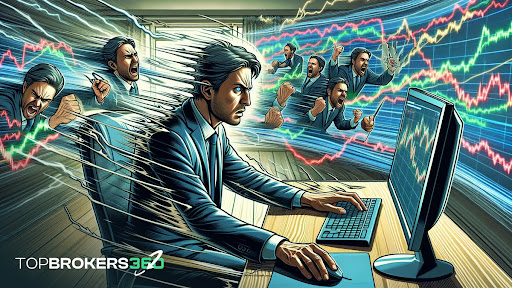Trading can be an emotional rollercoaster. Whether you’re riding high on a winning streak or grappling with a loss, your emotions can heavily influence your decisions.
Among the most dangerous emotional traps traders fall into is revenge trading. This is when traders attempt to quickly recover from a loss by making impulsive, high-risk decisions, often leading to even greater losses.
If you’ve ever felt the urge to “get even” after a trade goes wrong, you’re not alone. The emotional pull can be intense. However, giving in to these impulses can harm your trading account and your mental well-being. In this article, we’ll explore the signs of revenge trading and provide actionable strategies to avoid this costly mistake.
What is Revenge Trading?
Revenge trading is an emotional response that occurs when a trader feels the need to quickly recover from a loss. Instead of sticking to a well-structured trading plan, the trader impulsively enters trades in an attempt to “get back” the money lost. This emotional reaction can often cloud judgment and push traders to make decisions that stray far from their planned strategy.
Revenge trading is a common pitfall for traders. To better understand other frequent mistakes in trading, check out our article on the 3 Common Trading Mistakes to Avoid.

Psychology Behind Revenge Trading
When traders face a loss, especially a significant one, emotions like frustration, anger, and desperation can take over. In these moments, the desire to regain lost funds becomes overwhelming. It’s not uncommon for traders to think things like, “I can’t let the market win” or “I need to recover this loss fast”. These emotions can cloud rational thinking and lead to a series of bad decisions, worsening the situation.
Signs You’re Revenge Trading
Recognizing revenge trading early can save you from significant losses. Here are a few telltale signs:
- Trading Driven by Emotions (Anger or Frustration):
You may be trading to prove a point, fueled by anger or the desire to recover losses quickly. - Ignoring a Predefined Trading Plan:
Instead of following your trading strategy, you start making decisions based on emotions, such as increasing position size or deviating from your risk management rules. - Overleveraging and Overtrading:
After a loss, the impulse to recover quickly can lead to overleveraging or taking larger positions than usual, exposing you to greater risks. - Failure to Reflect on Past Trades:
You avoid reviewing your trades and instead focus solely on moving forward. The lack of reflection prevents growth and understanding of what went wrong.
In the next sections, we’ll explore the emotional triggers behind revenge trading and give you proven strategies to avoid it. By cultivating emotional awareness and self-discipline, you can protect your trading account and develop a more sustainable approach to the markets.
The Emotional Triggers and Rollercoaster of Trading
One of the most challenging aspects of trading is managing your emotions.
The highs of profitable trades can feel euphoric, while the lows can be devastating. As stated by the American Psychological Association, emotions such as frustration and anger can significantly impact decision-making.
The Emotional Rollercoaster of Trading
As a trader, it’s easy to become caught in a cycle of intense emotional highs and lows. The thrill of a profitable trade often boosts confidence, leading you to feel invincible. But when you face a loss, it can feel like the world is crashing down. These emotional shifts can cloud your judgment and push you to make impulsive decisions to “get back” at the market.
In my early trading days, I vividly remember feeling the exhilaration of multiple successful trades, followed by a significant loss that instantly shattered my confidence. My gut reaction was to take more trades—bigger, more aggressive ones—in an attempt to recover the loss quickly. But instead of following my plan, I traded impulsively, and the result was more losses. This emotional rollercoaster only worsened my frustration.
Understanding the Triggers
Revenge trading is often triggered by a combination of emotions and situations. Some common emotional triggers include:
- Frustration: The feeling that you “deserve” to win after a loss can push you to make impulsive decisions to recover.
- Anger: Anger at the market, yourself, or the situation can lead to rash decisions and ignoring sound trading practices.
- Fear of Missing Out (FOMO): The fear that the market might turn in your favor without you can prompt hasty trades, usually to the detriment of your strategy.
These emotions can drive traders to overcompensate for a loss by increasing their position size or frequency of trades, ultimately leading them to overexpose their account and set themselves up for failure.

How to Stop or Avoid Revenge Trading
The good news is that with awareness and the right strategies, revenge trading can be avoided or mitigated. Below are several techniques to help you stay grounded and make rational decisions, no matter the emotional pull.
1. Develop a Trading Plan
A well-defined trading plan is your blueprint for success. It should outline:
- Entry and exit strategies
- Risk management techniques (e.g., position sizing, stop-losses)
- Goals and objectives for each trade
Sticking to this plan, no matter the circumstances, will help prevent you from making impulsive decisions driven by emotions. When you stick to your plan, you’re less likely to engage in revenge trading, even after a loss.
2. Implement a Post-Loss Ritual
After a loss, rather than jumping back into the market immediately, take a moment to reflect. Here’s how you can create a post-loss ritual:
- Step back and take a break to clear your mind.
- Review your trades: What went wrong, and what can you learn from it?
- Journaling: Write down your thoughts and feelings about the trade, the reason for the loss, and your plan moving forward.
This process can help you process your emotions and reset, preventing knee-jerk reactions.
3. Practice Mindfulness
Mindfulness techniques can be incredibly effective in helping you stay emotionally balanced during trades. By practicing mindfulness, you become more aware of how your emotions affect your decisions. Some ways to practice mindfulness include:
- Breathing exercises to calm your mind when you feel emotions escalating.
- Meditation or simple mindfulness techniques before, during, and after trading sessions.
- Pause before every trade: Take a moment to check in with yourself and assess your emotional state.
By recognizing emotional triggers early, you can step away from your desk and avoid revenge trading.
4. Reduce Position Sizes After Losses
Another useful tactic is reducing your position size after a loss.
This allows you to recalibrate and manage risk more effectively, without the pressure to recover your losses all at once. It’s a simple yet powerful method to mitigate the emotional fallout from a loss.
5. Seek Support
Trading can be an isolating activity, but it doesn’t have to be.
Engaging with a trading community can offer emotional support and valuable insights. Discussing challenges like revenge trading with other traders can help you stay grounded. Consider reading our 5 Top Forex Forums for Traders for a deeper sense of connection and shared strategies.
Connecting with others can help normalize the struggles and prevent the loneliness that can sometimes drive you to revenge trading.
Setting Trading Rules to Avoid Revenge Trading
Creating and adhering to clear trading rules is one of the most effective ways to avoid falling into the trap of revenge trading. A solid set of rules serves as your foundation, guiding you through both good and bad trades while keeping emotions in check.
1. Stick to a Predefined Trading Plan
The cornerstone of your trading discipline is a well-crafted plan. A trading plan isn’t just about defining your strategies—it’s about ensuring that you never trade based on emotional impulses. Your plan should clearly outline:
- Entry and exit points: Know exactly when to enter a trade and when to exit.
- Stop-loss and take-profit levels: Set predefined points at which you will exit the trade to manage losses and lock in profits.
- Position sizing: Decide how much of your capital you’re willing to risk on each trade.
- Trade frequency: Determine how many trades you will make per day or week based on your strategy.
Adhering to this plan, regardless of emotional pressure, prevents you from entering a trade out of frustration or to make up for a loss. Your plan is your rulebook—stick to it, and the urge to revenge trade will diminish.
2. Set and Adhere to Stop-Losses
Stop-losses are a critical tool in managing risk and preventing revenge trading. A stop-loss ensures that you don’t lose more than a set amount on any single trade, acting as a safeguard when emotions cloud your judgment.
- Define your risk tolerance for each trade, and set stop-losses that align with your strategy.
- Avoid adjusting your stop-losses after a trade has been entered, especially out of emotional desperation to “recover” losses.
By setting and adhering to stop-losses, you can prevent the instinct to chase the market and make impulsive decisions.
3. Limit Daily Trading Activity
Overtrading is a common result of emotional stress, and it’s often the root cause of revenge trading. To avoid this, set limits on your trading activity:
- Limit the number of trades you make per day or week to avoid excessive exposure to emotional triggers.
- Create time-bound trading sessions: For example, only trade during specific hours of the day, and don’t trade after significant losses or stressful events.
Reducing the number of trades keeps you from reacting to every market move and helps you maintain a calm and rational approach.
4. Avoid Trading After Significant Losses
If you’ve just experienced a major loss, your emotional state might be too volatile to make clear decisions. In these moments, the urge to “revenge trade” can be strong.
- Take a break after a big loss to avoid acting impulsively.
- Use the time away from the screen to reassess the market and your strategy.
- Don’t trade when you’re emotionally charged: If you’re angry, frustrated, or anxious, step back and wait until you feel balanced before re-entering the market.
By allowing yourself time to recover from a loss, you can approach the next trade with a clearer, calmer mindset.
5. Use Risk Management Strategies
Risk management is the most important aspect of any trading strategy. It helps protect your capital and keeps emotions in check. Key strategies include:
- Don’t risk more than a small percentage of your trading capital on a single trade (typically 1–2%).
- Diversify your positions: Don’t put all your capital into one asset or trade.
- Utilize position sizing techniques to adjust trade sizes according to market volatility.
By sticking to these principles, you prevent yourself from making irrational decisions out of desperation or frustration after a loss.
6. Keep a Trading Journal
A trading journal is one of the most valuable tools for emotional regulation and self-awareness. By documenting each trade, including your thought process and emotional state, you gain insight into patterns of behavior.
- Write down your rationale for entering and exiting each trade.
- Record your emotions at each stage of the trade, especially after losses.
- Review your journal periodically to identify tendencies toward revenge trading.
This reflection will help you spot emotional triggers and provide an opportunity to recalibrate before making future decisions.
7. Set Realistic Goals
Unrealistic profit expectations can fuel the urge to overtrade and risk more to make up for losses. Instead, set achievable and realistic trading goals that align with your long-term objectives.
- Set small, achievable milestones instead of aiming for huge, quick profits.
- Celebrate small wins: Even minor gains are valuable in the long run.
This mindset prevents the frustration of unmet expectations and reduces the desire to “chase” losses through revenge trading.
8. Practice Patience and Discipline
Patience and discipline are the core attributes that successful traders develop over time. Avoid rushing into trades, especially when you feel the need to act out of frustration or the desire to recover.
- Wait for your setup: Don’t enter the market until the conditions match your trading strategy.
- Avoid chasing the market: If the setup isn’t right, walk away until the next opportunity arises.
Developing patience is key to overcoming emotional impulses that lead to revenge trading.
9. Avoid Trading During High-Stress Times
Trading when stressed, anxious, or upset is a recipe for disaster. Emotional turbulence directly influences decision-making, making it difficult to trade logically.
- Assess your mental and emotional state before trading. If you’re feeling overwhelmed, take a break.
- Set boundaries for trading hours and avoid trading when personal or external stresses are high.
By trading only when you’re mentally prepared, you can avoid the emotional rollercoaster that often leads to revenge trading.
10. Take Regular Breaks
Finally, it’s essential to take regular breaks to refresh your mind and reduce the risk of burnout. Constantly staring at the market can cause fatigue, leading to poor decisions driven by emotion rather than strategy.
- Step away from your screen after every trade or at regular intervals.
- Engage in other activities to clear your head and reset.
Taking breaks helps you maintain a balanced perspective, which is crucial to avoiding impulsive, revenge-driven trades.
Conclusion
Revenge trading is a powerful emotional pitfall that many traders face, but it doesn’t have to define your trading journey. Understanding the psychology behind revenge trading, recognizing the signs, and implementing a well-thought-out plan can help you manage emotions and prevent destructive trading behavior.
Remember, trading isn’t about winning every single trade—it’s about consistency, discipline, and following a strategy. The key to long-term success in the markets is emotional control. By sticking to your trading plan, practicing sound risk management, and allowing yourself the space to process losses, you’ll avoid the cycle of impulsive trading and set yourself up for more sustainable profits.
Trading is not a sprint; it’s a marathon. With patience, practice, and adherence to the rules you set for yourself, you’ll strengthen your ability to think logically and strategically, rather than emotionally.
So, next time you face a loss, take a step back, reassess, and remind yourself that revenge trading only leads to more losses. Trust your process, manage your risk, and stay focused on your long-term goals. The rewards of disciplined trading will come, and you’ll be ready to navigate the markets with a clear, calm, and confident mindset.
